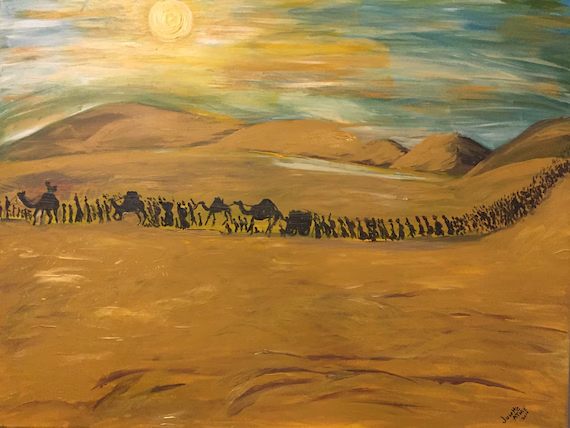David and Goliath
Ruth's great grandson, David worked on his father's farm, looking after the sheep. Although he was only a boy, he was strong and brave.
He fought off bears and even lions, when they tried to steal the sheep. Every day he led the flocks out on the hills, finding the best grass for them. While he watched them, he often played lovely music on his little harp. He also became very good at firing stones with his sling.
One day, David's father asked him to take food to three of his brothers, who were soldiers in the army of King Saul. He was the King of Israel, the kingdom of the Israelites.
For many years, the Israelites had been fighting the Philistines. Now King Saul's army was camped on one side of the valley. On the other side was the Philistine army. The two armies watched each other, neither daring to attack.
One Philistine soldier was a giant of a man whose name was Goliath. He was immensely strong and wore a huge breastplate and carried an enormous shield and a spear.
Every day, he shouted across the valley to King Saul; 'Send one of your men to fight me. Whoever wins the battle, wins for the whole army. The losers will become servants of the victor.
The soldiers in King Saul's army listened to the challenge, but none of them dared to go. When David reached the camp and was talking to his brothers, he heard Goliath shouting across the valley..
He went to King Saul. 'I'll go and fight him. he said. 'You can't go. You are only a boy, and that man is a trained soldier, said King Saul.
'I'm not afraid. When I was looking after my father's sheep. I killed bears and lions. God saved me from them, and he will save me from Goliath, replied David.
'You may go and may God go with you, said King Saul. 'But you must wear my fighting clothes, and take my sword.
David put on a helmet and a coat of chain mail and picked up a sword. But they were so heavy he could hardly walk, so he took them off again. 'I can't wear them, he said.
He picked up his shepherd's stick and chose five small stones from the bed of the stream. He put them in a bag, took his sling and strode down the valley to meet Goliath.
When Goliath saw David coming, he laughed; 'Are you the champion? Come here, boy, and I'll kill you, he shouted.
David walked on, you have a sword, shield and a spear, but I have God to help me, said David. He put one of the little stones in his sling, swung the sling around and around his head, and let the stone fly.
The stone shot straight at Goliath and hit the giant right in the middle of his forehead. Goliath fell down on the ground, David ran up to him and saw that he was dead. He had killed the Philistine.
When the Philistine army saw their champion lying dead on the ground, they were so frightened they all ran away.
King Saul's army chased them, right up to the gates of their city. With God's help. David had won a great victory for the Israelites over the Philistines.










Comments
Post a Comment